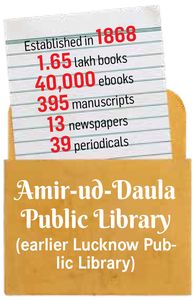Lucknow’s oldest library is housed in a white building, but its collection is anything but monochromatic.
The Amir-ud-Daula Public Library’s rich collection of original manuscripts written on copper plates includes The Dhammapada, an 18th century Buddhist text of proverbs and maxims written in old square Burmese characters, and the original copy of Inder Sabha by Agha Hasan Amanat. The latter is considered the first complete play written in Urdu. The play depicts a prince’s love story with fairies; Awadh’s last nawab—Wajid Ali Shah—performed the role of the prince.
The library has books on almost every imaginable subject—from warfare to the occult; and from German secret service to the history of Urdu literature in Tamil Nadu. The fiction section packs in everything from Hans Christian Anderson’s fairy tales to Casanova: Adventurer and Lover by Joseph Le Gras. It also has census records dating back to 1391 (with a separate volume for caste census) and gazettes dating back to the 1700s.
Also read
- Photo-feature: For the love of libraries and why we need them
- Looking for the oldest public library in India? Head to Thiruvananthapuram
- How Syed Issac is rebuilding his Public Library in Mysuru from the ashes
- Warangal's Regional Library is a selfie spot
- Gnanalaya library in Tamil Nadu is a collector's find
- The history of David Sassoon Library is the history of Bombay
The library was set up in 1868, but was thrown open to public—only students—in 1887. It is named after Mohammad Amir Hasan Khan, the erstwhile Raja of Mahmoodabad and then chairperson of the British India Association of Oudh.
The library premises are spread over 3,000sqm. Though constructed after the age of the Nawabs, the building, with Indo-Islamic architectural elements, blends into the surrounding structures that comprise the Qaiserbagh Heritage Zone.
The library is undergoing digitisation under the Lucknow Smart City Project. So far, 24,000 books have been digitised. A member of the digital team said that while the library contained books and documents ‘beyond imagination’ it was unfortunate that there was no library expert engaged in the task of digitisation.
The pandemic has forced members to stay away from the library and because of the ongoing digitisation, new memberships are on hold.
Harish Chandra, who is in charge of the library, said, “A library is like an ocean. Those who seek depth of knowledge will always need books. The internet can give you only [so] much.”



